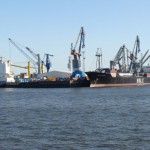New Developments at the Russian Maritime Arbitration Commission
 At the end of December 2011 a number of aspects concerning the functioning of the Maritime Arbitration Commission at the Chamber of Commerce and Industry of the Russian Federation (MAC) changed. In particular, a new list of MAC arbitrators was approved and the MAC Rules were amended.
At the end of December 2011 a number of aspects concerning the functioning of the Maritime Arbitration Commission at the Chamber of Commerce and Industry of the Russian Federation (MAC) changed. In particular, a new list of MAC arbitrators was approved and the MAC Rules were amended.
In addition, the procedure for the election of the MAC Chairman was amended. In the past, an assembly of all the arbitrators carried out the election, whereas under the amended system the Presidium makes the decision (similarly to the rules of many international arbitral institutions).
Moreover, the management of the MAC also underwent changes. Since 1974, the Chairman of the MAC was a renowned Russian lawyer, Vice-President of the ICCA, Sergey Lebedev. Now the reins of the MAC management have been entrusted to another prominent Russian lawyer, Professor Alexey Kostin, Head of the Private International and Civil Law Department at the Moscow State Institute of International Relations (MGIMO). Last year Professor Kostin was also elected as Chairman of the International Commercial Arbitration Court at the Chamber of Commerce and Industry of the Russian Federation. The election took place at the MAC Presidium and the Russian Chamber of Commerce and Industry approved the new composition.
Dr Alexander Makovsky, from the Council of the Private Law Research Center co-ordinated by the Presidential Executive Office, and Professor Alexander Muranov, of MGIMO and managing partner of Muranov Chernyakov & Partners, became new Vice-Chairmen of the MAC.
MAC History
The MAC was founded in 1930 at the Chamber of Commerce and Industry of the USSR. It was established as a specialised arbitral institution for the consideration of disputes arising from merchant shipping. Immediately after its creation the MAC began to successfully resolve many high-profile maritime cases. In Soviet times the most frequent parties to MAC arbitration consisted of: sea shipping companies (among others, the Baltic, Black Sea, Soviet Danube, Azov, Far East shipping companies in particular); salvage and rescue services and other organisations of the Ministry of Marine Sea Fleet; foreign trade associations such as Exportles, Raznoexport and Soyuzplodoimport; fishery enterprises; and the joint-stock company Ingosstrakh.
Sea navigation plays a key role in the Russian economy, and occupies a central place in the transport system. The regulation of merchant shipping is an effective foreign economic policy tool – one which is used by many States, including Russia. A vital aspect of such policy is the existence of an appropriate dispute resolution mechanism. As is known, such disputes fall within the competence of the State courts, but arbitral tribunals play an even greater role in their resolution globally.
The competence of the MAC includes all civil law disputes connected with merchant shipping, including disputes relating to the transport of cargoes, chartering of vessels, sea insurance, rescuing of vessels, fishing operations, collisions between vessels, disputes from agency and broker relations, sales and repair of vessels. The MAC resolves both Russian and international disputes, including those where none of the parties involved are Russian. The geographic reach of the countries represented in MAC disputes over the past 20 years is very extensive. Companies from more than 70 countries have participated in such cases, including Russian and foreign insurance companies, ship-owners, users of transportation services, ports and repair shops.
MAC Today
According to Alexey Kostin, it is the necessity of modernising and intensifying the development of the MAC – the oldest Russian permanent arbitral institution – that has brought about these changes. Progress in maritime arbitration in modern Russia was necessary because maritime affairs are very capital-intensive (sea vessels are qualified by Russian law as real estate and are very expensive) and Russia strives to strengthen its role in international maritime transport and the development of a domestic merchant marine fleet. Various incidents occur frequently to Russian and foreign vessels at sea, each of which can result in a dispute which requires resolution. Thus there is particular value in having an experienced and active MAC.
Very often disputes heard by the MAC are very complicated from a legal point of view, so this necessitates high professionalism among arbitrators. Over the years the MAC’s case-load has grown rapidly in the field of the settlement of disputes between companies engaged in maritime affairs: the MAC has heard about 4,500 such cases. During the last 20 years the MAC has heard cases totaling US$200 million.
As regards the applicable law, in the period 1991-2010 the MAC largely applied Russian law. However there have been cases where English, Ukrainian, Norwegian, Latvian, Moroccan and even the law of Saint Vincent and Grenadines was applied.











